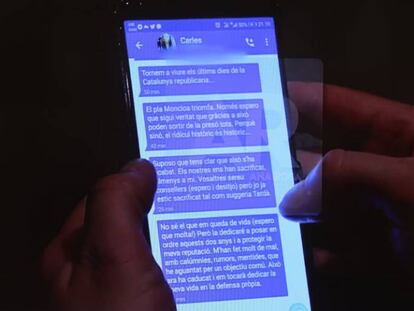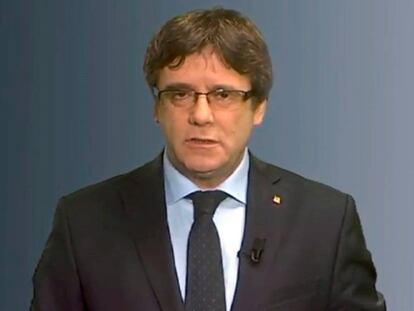Madrid doubts Puigdemont will step aside despite his defeatist messages
Opposition is calling on the ousted Catalan premier to let another candidate bid for the premiership

The Spanish government does not expect Carles Puigdemont to give up his fight to be the next Catalan premier even though in leaked text messages he confessed he had been defeated.
In a private conversation via the messaging service Signal, Puigdemont told Toni Comín, a deputy-elect for the Catalan Republic Left (ERC) who fled to Brussels with him last year, that he had been beaten by the Spanish central government: “The Moncloa [the seat of the Spanish prime minister] plan has triumphed.
The investiture of Puigdemont is impossible Miquel Iceta, Catalan Socialists
“It’s over. Our own followers have given us up,” reads the message, which was captured by a television cameraman who was standing behind Comín, and broadcast on the private TV network Telecinco on Wednesday.
Puigdemont did not deny sending the messages, arguing they were written at a moment of weakness. “I’m human and there are moments in which I also have my doubts. I’m also the premier and I will not bow down or retreat out of respect, appreciation and commitment for the citizens and the country. Let’s move forward!” he wrote on Twitter after the messages came to light.
Government sources say Madrid does not believe Puigdemont’s reflections mean that he will stand aside and allow another candidate to be nominated to the premiership. According to these sources, the Spanish government expects pro-independence parties to look for alternatives to Puigdemont given the legal difficulties of his investiture, but is not ruling out the possibility that they will rally around him instead. Puigdemont’s supporters jumped on social media to defend the leader of the Junts per Catalunya party following the release of the messages.
Calls for resignation
Parties that opposed Catalan independence have used the messages to renew calls for Puigdemont to step aside.
Puigdemont is currently in self-imposed exile in Brussels after fleeing Spain to escape charges of sedition, rebellion and misuse of public funds over his involvement in the unilateral declaration of independence last October. On Saturday, Spain’s Constitutional Court ruled that Puigdemont can only become the new head of government if he first seeks permission from a judge to physically attend the debate, meaning the politician cannot be sworn in remotely or by delegating his vote.

Opposition parties say Puigdemont’s messages reveal the “farcical” nature of this situation. Inés Arrimadas, the leader of Ciudadanos, a pro-unity party that won the most votes at the December 21 election, asked for leaders of pro-independence parties to have “the courage” to accept that the independence push “died along time ago.”
Miquel Iceta, the leader of the Catalan branch of the Spanish Socialist Party (PSC), called on Puigdemont to let another candidate step up. Puigdemont is not in a position to “effectively serve as premier.” “Legally, the investiture of Puigdemont is impossible and many people from the independence movement are saying this under their breath,” he added.
The leader of the Catalan branch of the conservative Popular Party (PP), Xavier Garcìa Albiol, demanded that Puigdemont stop “making a fool of himself” and give up his push to be the premier. The PP deputy said the messages showed Puigdemont had had “an attack of sincerity and has expressed what his colleagues have already said privately.” Spanish Deputy Prime Minister Soraya Sáenz de Santamaría has likewise called on the Catalan parliament to start a round of talks and propose a new candidate.
English version by Melissa Kitson.
Tu suscripción se está usando en otro dispositivo
¿Quieres añadir otro usuario a tu suscripción?
Si continúas leyendo en este dispositivo, no se podrá leer en el otro.
FlechaTu suscripción se está usando en otro dispositivo y solo puedes acceder a EL PAÍS desde un dispositivo a la vez.
Si quieres compartir tu cuenta, cambia tu suscripción a la modalidad Premium, así podrás añadir otro usuario. Cada uno accederá con su propia cuenta de email, lo que os permitirá personalizar vuestra experiencia en EL PAÍS.
En el caso de no saber quién está usando tu cuenta, te recomendamos cambiar tu contraseña aquí.
Si decides continuar compartiendo tu cuenta, este mensaje se mostrará en tu dispositivo y en el de la otra persona que está usando tu cuenta de forma indefinida, afectando a tu experiencia de lectura. Puedes consultar aquí los términos y condiciones de la suscripción digital.










































